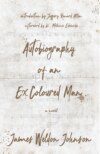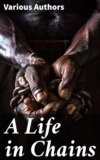Читать книгу: «Fifty years & Other Poems», страница 2
Шрифт:
O BLACK AND UNKNOWN BARDS
O black and unknown bards of long ago,
How came your lips to touch the sacred fire?
How, in your darkness, did you come to know
The power and beauty of the minstrel's lyre?
Who first from midst his bonds lifted his eyes?
Who first from out the still watch, lone and long,
Feeling the ancient faith of prophets rise
Within his dark-kept soul, burst into song?
Heart of what slave poured out such melody
As "Steal away to Jesus"? On its strains
His spirit must have nightly floated free,
Though still about his hands he felt his chains.
Who heard great "Jordan roll"? Whose starward eye
Saw chariot "swing low"? And who was he
That breathed that comforting, melodic sigh,
"Nobody knows de trouble I see"?
What merely living clod, what captive thing,
Could up toward God through all its darkness grope,
And find within its deadened heart to sing
These songs of sorrow, love, and faith, and hope?
How did it catch that subtle undertone,
That note in music heard not with the ears?
How sound the elusive reed so seldom blown,
Which stirs the soul or melts the heart to tears.
Not that great German master in his dream
Of harmonies that thundered amongst the stars
At the creation, ever heard a theme
Nobler than "Go down, Moses." Mark its bars,
How like a mighty trumpet-call they stir
The blood. Such are the notes that men have sung
Going to valorous deeds; such tones there were
That helped make history when Time was young.
There is a wide, wide wonder in it all,
That from degraded rest and servile toil
The fiery spirit of the seer should call
These simple children of the sun and soil.
O black slave singers, gone, forgot, unfamed,
You—you alone, of all the long, long line
Of those who've sung untaught, unknown, unnamed,
Have stretched out upward, seeking the divine.
You sang not deeds of heroes or of kings;
No chant of bloody war, no exulting pean
Of arms-won triumphs; but your humble strings
You touched in chord with music empyrean.
You sang far better than you knew; the songs
That for your listeners' hungry hearts sufficed
Still live,—but more than this to you belongs:
You sang a race from wood and stone to Christ.
O SOUTHLAND!
O Southland! O Southland!
Have you not heard the call,
The trumpet blown, the word made known
To the nations, one and all?
The watchword, the hope-word,
Salvation's present plan?
A gospel new, for all—for you:
Man shall be saved by man.
O Southland! O Southland!
Do you not hear to-day
The mighty beat of onward feet,
And know you not their way?
'Tis forward, 'tis upward,
On to the fair white arch
Of Freedom's dome, and there is room
For each man who would march.
O Southland, fair Southland!
Then why do you still cling
To an idle age and a musty page,
To a dead and useless thing?
'Tis springtime! 'Tis work-time!
The world is young again!
And God's above, and God is love,
And men are only men.
O Southland! my Southland!
O birthland! do not shirk
The toilsome task, nor respite ask,
But gird you for the work.
Remember, remember
That weakness stalks in pride;
That he is strong who helps along
The faint one at his side.
To HORACE BUMSTEAD
Have you been sore discouraged in the fight,
And even sometimes weighted by the thought
That those with whom and those for whom you fought
Lagged far behind, or dared but faintly smite?
And that the opposing forces in their might
Of blind inertia rendered as for naught
All that throughout the long years had been wrought,
And powerless each blow for Truth and Right?
If so, take new and greater courage then,
And think no more withouten help you stand;
For sure as God on His eternal throne
Sits, mindful of the sinful deeds of men,
—The awful Sword of Justice in His hand,—
You shall not, no, you shall not, fight alone.
THE COLOR SERGEANT
(On an Incident at the Battle of San Juan Hill)
Under a burning tropic sun,
With comrades around him lying,
A trooper of the sable Tenth
Lay wounded, bleeding, dying.
First in the charge up the fort-crowned hill,
His company's guidon bearing,
He had rushed where the leaden hail fell fast,
Not death nor danger fearing.
He fell in the front where the fight grew fierce,
Still faithful in life's last labor;
Black though his skin, yet his heart as true
As the steel of his blood-stained saber.
And while the battle around him rolled,
Like the roar of a sullen breaker,
He closed his eyes on the bloody scene,
And presented arms to his Maker.
There he lay, without honor or rank,
But, still, in a grim-like beauty;
Despised of men for his humble race,
Yet true, in death, to his duty.
THE BLACK MAMMY
O whitened head entwined in turban gay,
O kind black face, O crude, but tender hand,
O foster-mother in whose arms there lay
The race whose sons are masters of the land!
It was thine arms that sheltered in their fold,
It was thine eyes that followed through the length
Of infant days these sons. In times of old
It was thy breast that nourished them to strength.
So often hast thou to thy bosom pressed
The golden head, the face and brow of snow;
So often has it 'gainst thy broad, dark breast
Lain, set off like a quickened cameo.
Thou simple soul, as cuddling down that babe
With thy sweet croon, so plaintive and so wild,
Came ne'er the thought to thee, swift like a stab,
That it some day might crush thine own black child?
FATHER, FATHER ABRAHAM
(On the Anniversary of Lincoln's Birth)
Father, Father Abraham,
To-day look on us from above;
On us, the offspring of thy faith,
The children of thy Christ-like love.
For that which we have humbly wrought,
Give us to-day thy kindly smile;
Wherein we've failed or fallen short,
Bear with us, Father, yet awhile.
Father, Father Abraham,
To-day we lift our hearts to thee,
Filled with the thought of what great price
Was paid, that we might ransomed be.
To-day we consecrate ourselves
Anew in hand and heart and brain,
To send this judgment down the years:
The ransom was not paid in vain.
BROTHERS
See! There he stands; not brave, but with an air
Of sullen stupor. Mark him well! Is he
Not more like brute than man? Look in his eye!
No light is there; none, save the glint that shines
In the now glaring, and now shifting orbs
Of some wild animal caught in the hunter's trap.
How came this beast in human shape and form?
Speak, man!—We call you man because you wear
His shape—How are you thus? Are you not from
That docile, child-like, tender-hearted race
Which we have known three centuries? Not from
That more than faithful race which through three wars
Fed our dear wives and nursed our helpless babes
Without a single breach of trust? Speak out!
I am, and am not.
Then who, why are you?
I am a thing not new, I am as old
As human nature. I am that which lurks,
Ready to spring whenever a bar is loosed;
The ancient trait which fights incessantly
Against restraint, balks at the upward climb;
The weight forever seeking to obey
The law of downward pull;—and I am more:
The bitter fruit am I of planted seed;
The resultant, the inevitable end
Of evil forces and the powers of wrong.
Lessons in degradation, taught and learned,
The memories of cruel sights and deeds,
The pent-up bitterness, the unspent hate
Filtered through fifteen generations have
Sprung up and found in me sporadic life.
In me the muttered curse of dying men,
On me the stain of conquered women, and
Consuming me the fearful fires of lust,
Lit long ago, by other hands than mine.
In me the down-crushed spirit, the hurled-back prayers
Of wretches now long dead,—their dire bequests.—
In me the echo of the stifled cry
Of children for their bartered mothers' breasts.
I claim no race, no race claims me; I am
No more than human dregs; degenerate;
The monstrous offspring of the monster, Sin;
I am—just what I am.... The race that fed
Your wives and nursed your babes would do the same
To-day, but I—
Enough, the brute must die!
Quick! Chain him to that oak! It will resist
The fire much longer than this slender pine.
Now bring the fuel! Pile it 'round him! Wait!
Pile not so fast or high! or we shall lose
The agony and terror in his face.
And now the torch! Good fuel that! the flames
Already leap head-high. Ha! hear that shriek!
And there's another! wilder than the first.
Fetch water! Water! Pour a little on
The fire, lest it should burn too fast. Hold so!
Now let it slowly blaze again. See there!
He squirms! He groans! His eyes bulge wildly out,
Searching around in vain appeal for help!
Another shriek, the last! Watch how the flesh
Grows crisp and hangs till, turned to ash, it sifts
Down through the coils of chain that hold erect
The ghastly frame against the bark-scorched tree.
Stop! to each man no more than one man's share.
You take that bone, and you this tooth; the chain—
Let us divide its links; this skull, of course,
In fair division, to the leader comes.
And now his fiendish crime has been avenged;
Let us back to our wives and children.—Say,
What did he mean by those last muttered words,
"Brothers in spirit, brothers in deed are we"?
FRAGMENT
The hand of Fate cannot be stayed,
The course of Fate cannot be steered,
By all the gods that man has made,
Nor all the devils he has feared,
Not by the prayers that might be prayed
In all the temples he has reared.
See! In your very midst there dwell
Ten thousand thousand blacks, a wedge
Forged in the furnaces of hell,
And sharpened to a cruel edge
By wrong and by injustice fell,
And driven by hatred as a sledge.
A wedge so slender at the start—
Just twenty slaves in shackles bound—
And yet, which split the land apart
With shrieks of war and battle sound,
Which pierced the nation's very heart,
And still lies cankering in the wound.
Not all the glory of your pride,
Preserved in story and in song,
Can from the judging future hide,
Through all the coming ages long,
That though you bravely fought and died,
You fought and died for what was wrong.
'Tis fixed—for them that violate
The eternal laws, naught shall avail
Till they their error expiate;
Nor shall their unborn children fail
To pay the full required weight
Into God's great, unerring scale.
Think not repentance can redeem,
That sin his wages can withdraw;
No, think as well to change the scheme
Of worlds that move in reverent awe;
Forgiveness is an idle dream,
God is not love, no, God is law.
Возрастное ограничение:
0+Дата выхода на Литрес:
07 декабря 2018Объем:
50 стр. 1 иллюстрацияКомментатор:
Правообладатель:
Public Domain














